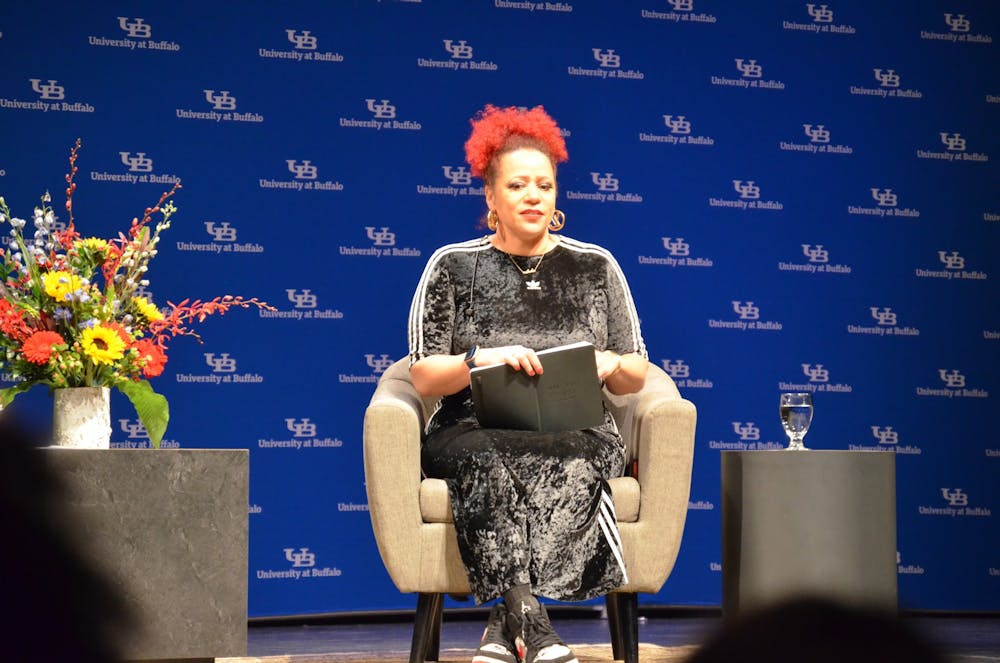Nikole Hannah-Jones, a Pulitzer-prize winning staff writer for The New York Times Magazine, told audience members Wednesday that “the answers are not going to come from us [the older generation]. The youth have always led.”
Hannah-Jones served as UB’s 46th Annual Martin Luther King Jr. Commemoration Keynote Speaker Wednesday at the Center for the Arts. Her 50-minute Q&A session touched on the value of representation in education, the importance of affecting positive change and the idea that progress toward racial equality isn’t guaranteed.
The Notre Dame and University of North Carolina alum is the creator of The 1619 Project, an initiative through The New York Times Magazine that refocuses conversations on U.S. history to reflect the effects of slavery and institutionalized racism. She is also a professor at Howard University, a historically Black college in Washington.
Hannah-Jones says she came across the year 1619 in a Black studies elective she took in high school. She says the course exposed her more to Black history and literature than her “entire K-12 [educational] career.” 1619 is the year enslaved Africans were first brought to North America.
“My teacher, Mr. Raydial, I would ask him to give me books on my own [because that] one hour class was not enough,” Hannah-Jones said. “One of the books he gave me was, ‘Before the Mayflower’ by Leronne Bennet. That’s the day I read about 1619. And I was like, ‘Oh, ‘Before the Mayflower’ was talking about a year before the Mayflower, when the ship by the name of the White Lion [came] to Virginia. And that history had been erased.”
Hannah-Jones says she chose the year 1619 for her project so she could highlight the fallacies surrounding Black history in U.S. education.
“So fast forward to 2019 or late 2018, I am obsessing over this approaching 400-year anniversary and still, most Americans had never heard of the date,” Hannah-Jones said. “I just knew it was going to pass with very little public acknowledgment.”
So Hannah-Jones decided to change the narrative by pitching The 1619 Project to her editors at the Times. When she “didn’t receive any pushback,” she felt validated to proceed with the project. Her initiative earned national acclaim, and in 2020, she received the Pulitzer Prize for Commentary for her introductory essay. Since 2019, The 1619 Project has been a required reading in the Buffalo School District.
The Waterloo, IA native has personally invested in her cause with the literacy program she founded in her hometown, which is called the “1619 Freedom School.” The free after-school initiative seeks to improve the literacy skills of Black students by providing free instruction centered around Black American history.
Jada Mowatt, a senior chemical and biological engineering major, received the 2022 MLK Jr. Scholarship, which is awarded annually by UB’s Minority Faculty and Staff Association to a junior or senior-of-color who “demonstrates high academic standards and leadership ability, and who exemplifies personal character that advances the spirit and philosophy of Dr. King.”
“Things are very, very tough right now given our circumstances,” Mowatt said. “So just knowing how to keep pushing when things are tough was really inspiring to hear.”
At age 11, Hannah-Jones wrote a letter to the editor of her local newspaper lamenting that Jesse Jackson didn’t win the 1988 Democratic Party nomination for president in part because of his race.
She channeled that passion into a career as a journalist, activist and teacher of Black history. Today, she hopes younger people use that same energy in their endeavors.
“As a 16-year-old Black child, I was both enraged that all of these years, when I thought the reason no one ever taught us about the history of Black people was because Black people didn’t have a history that could be taught, that we hadn’t done much of importance,” Hannah-Jones said.
The news desk can be reached at news@ubspectrum.com





